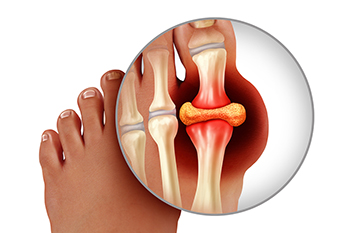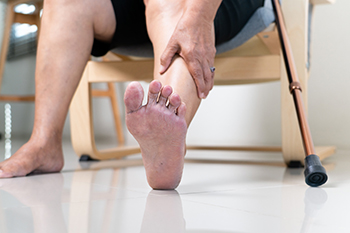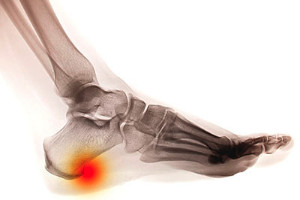Items filtered by date: June 2025
Podiatric Care for Ankle Sprains

An ankle sprain occurs when the ligaments that support the ankle stretch or tear, usually due to sudden twisting or rolling of the foot. Inversion sprains happen when the foot rolls inward, affecting the outer ligaments, while eversion sprains involve the foot rolling outward, impacting the inner ligaments. Common causes include sports injuries, uneven surfaces, or missteps. Symptoms include pain, swelling, bruising, and limited mobility. Among the risk factors are poor footwear, weak ankle muscles, and previous sprains. A podiatrist can assess the severity of the sprain, provide imaging, if needed, and develop a treatment plan that may include rest, bracing, or specific stretches and exercises. If you experience ankle pain or instability, it is suggested that you consult a podiatrist for expert care and recovery guidance.
Although ankle sprains are common, they aren’t always minor injuries. If you need your ankle injury looked at, contact one of our podiatrists from Florida. Our doctors can provide the care you need to keep you pain-free and on your feet.
How Does an Ankle Sprain Occur?
Ankle sprains are the result of a tear in the ligaments within the ankle. These injuries may happen when you make a rapid shifting movement while your foot is planted. A less common way to sprain your ankle is when your ankle rolls inward while your foot turns outward.
What Are the Symptoms?
- Pain at the sight of the tear
- Bruising/Swelling
- Ankle area is tender to touch
- In severe cases, may hear/feel something tear
- Skin discoloration
Preventing a Sprain
- Wearing appropriate shoes for the occasion
- Stretching before exercises and sports
- Knowing your limits
Treatment of a Sprain
In many cases, the RICE method (Rest, Ice, Compression, and Elevate) is used to treat ankle sprains. However, you should see a podiatrist to see which treatment option would work best with your injury. In severe cases, surgery may be required.
It is important to ask your doctor about rehab options after you receive treatment for your injury. Stretching, strength training, and balance exercises may help the ankle heal while also preventing further injury.
If you have any questions, please feel free to contact our offices located in North Miami, and Pembroke Pines, FL . We offer the newest diagnostic and treatment technologies for all your foot care needs.
Are You Suffering From Ingrown Toenails?
Managing Pain and Preventing Gout Flare-Ups

Gout is a form of inflammatory arthritis caused by a buildup of uric acid crystals in the joints, often affecting the big toe. This condition leads to sudden and severe pain, redness, and swelling. Risk factors include obesity, high blood pressure, diabetes, and a diet high in red meat, seafood, and alcohol. Symptoms can come on quickly and may return if not properly managed. To reduce the risk of flare-ups, individuals are encouraged to consume low-purine foods such as fruits, vegetables, whole grains, and plenty of water. A podiatrist can help by diagnosing the condition, managing pain, and offering long-term strategies. If you have gout attacks, it is suggested that you seek care from a podiatrist to manage gout effectively and protect your joint health.
Gout is a painful condition that can be treated. If you are seeking treatment, contact one of our podiatrists from Florida. Our doctors will treat your foot and ankle needs.
What Is Gout?
Gout is a form of arthritis that is characterized by sudden, severe attacks of pain, redness, and tenderness in the joints. The condition usually affects the joint at the base of the big toe. A gout attack can occur at any random time, such as the middle of the night while you are asleep.
Symptoms
- Intense Joint Pain - Usually around the large joint of your big toe, and it most severe within the first four to twelve hours
- Lingering Discomfort - Joint discomfort may last from a few days to a few weeks
- Inflammation and Redness -Affected joints may become swollen, tender, warm and red
- Limited Range of Motion - May experience a decrease in joint mobility
Risk Factors
- Genetics - If family members have gout, you’re more likely to have it
- Medications - Diuretic medications can raise uric acid levels
- Gender/Age - Gout is more common in men until the age of 60. It is believed that estrogen protects women until that point
- Diet - Eating red meat and shellfish increases your risk
- Alcohol - Having more than two alcoholic drinks per day increases your risk
- Obesity - Obese people are at a higher risk for gout
Prior to visiting your podiatrist to receive treatment for gout, there are a few things you should do beforehand. If you have gout you should write down your symptoms--including when they started and how often you experience them, important medical information you may have, and any questions you may have. Writing down these three things will help your podiatrist in assessing your specific situation so that he or she may provide the best route of treatment for you.
If you have any questions, please feel free to contact our offices located in North Miami, and Pembroke Pines, FL . We offer the newest diagnostic and treatment technologies for all your foot care needs.
Relief for Common Foot Problems in Older Adults

As people age, they often experience a range of foot problems that can affect mobility and quality of life. Common foot problems among seniors include arthritis, which causes joint pain and stiffness, bunions that lead to swelling and deformity at the base of the big toe, and hammertoes that result in curled or bent toe joints. In addition, corns may develop from friction, and diabetes can lead to serious foot complications like poor circulation and slow wound healing. A podiatrist can provide tailored treatment, manage chronic conditions, and help maintain comfort and independence in older adults. If you are elderly and are experiencing any foot pain, it is strongly suggested that you are under the care of this type of doctor who can help you with effective relief and treatment solutions.
If you need your feet checked, contact one of our podiatrists of Florida. Our doctors will attend to all of your foot and ankle needs and provide you with quality treatment.
Geriatrics and Podiatry
When people age, some common issues that may occur are bone density loss, dry skin, poor circulation, and rough brittle nails. These issues may also affect your foot health if the necessary steps are not taken to alleviate the problems.
It is important to take care of your feet because feet that are injured or diseased can affect your overall health. Having painful feet hinders your ability to do daily activities or may decrease your willingness to do the things that you need to do.
Visiting Your Geriatrician
As we age, health problems become more likely, so it is essential to visit your doctor for check-ups to ensure that you are doing the best you can to take care of your health. It is recommended to check your feet frequently for any possible cuts, bruises, swelling, corns or any other irregularities.
Taking Care of Elderly Feet
Cracked or dry feet can be treated by applying moisturizer often. It is also important not to wear old socks because the older the sock is, the higher the possibility there will be that there is bacteria there. Wear fresh socks and make sure they fit properly.
Proper foot health means that you can have a more active lifestyle and you will not be bogged down by pain. Foot health also leads to good circulation, which is paramount for overall health.
If you have any questions, please feel free to contact our offices located in North Miami, and Pembroke Pines, FL . We offer the newest diagnostic and treatment technologies for all your foot care needs.
Common Types of Heel Spurs

Heel spurs are calcium deposits that form on the heel bone and can cause significant foot pain. The two most common types are posterior heel spurs, which develop at the back of the heel near the Achilles tendon, and plantar heel spurs, which form on the bottom of the heel and are often linked to plantar fasciitis. Causes include repeated strain on foot muscles and ligaments, long periods of standing, or improper footwear. Symptoms may involve sharp pain when standing or walking, especially after rest. Risk factors include obesity, flat feet, high arches, and increased physical activity. A podiatrist can diagnose heel spurs through imaging and provide personalized treatments. If you have persistent heel pain, it is suggested that you schedule an appointment with a podiatrist who can offer lasting relief and help prevent further complications.
Heel spurs can be incredibly painful and sometimes may make you unable to participate in physical activities. To get medical care for your heel spurs, contact one of our podiatrists from Florida. Our doctors will do everything possible to treat your condition.
Heels Spurs
Heel spurs are formed by calcium deposits on the back of the foot where the heel is. This can also be caused by small fragments of bone breaking off one section of the foot, attaching onto the back of the foot. Heel spurs can also be bone growth on the back of the foot and may grow in the direction of the arch of the foot.
Older individuals usually suffer from heel spurs and pain sometimes intensifies with age. One of the main condition's spurs are related to is plantar fasciitis.
Pain
The pain associated with spurs is often because of weight placed on the feet. When someone is walking, their entire weight is concentrated on the feet. Bone spurs then have the tendency to affect other bones and tissues around the foot. As the pain continues, the feet will become tender and sensitive over time.
Treatments
There are many ways to treat heel spurs. If one is suffering from heel spurs in conjunction with pain, there are several methods for healing. Medication, surgery, and herbal care are some options.
If you have any questions, please feel free to contact our offices located in North Miami, and Pembroke Pines, FL . We offer the newest diagnostic and treatment technologies for all your foot care needs.

